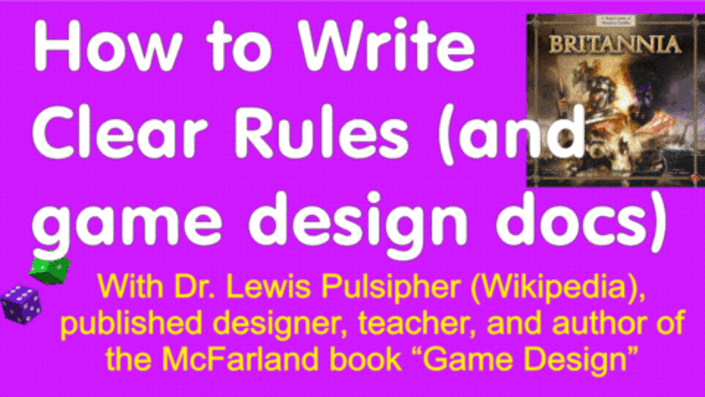
How to Write Clear Rules (and Game Design Documents)
Poorly written published rules can ruin a tabletop game. Rules/design documents may be the hardest part of game design.
If you're doing it right, one of the hardest parts of game design is writing clear rules. How to do it varies with your audience - of course. Polish the rules as you playtest.
If you're designing a video game for other people to produce (program, art, sound, etc.) then you have to write very clear game design documents if you want things to work as you envision.
This course is primarily about writing formal rules for games, usually tabletop games, but writing a game design document requires similar skills, as it must explicitly describe every possible interaction between player(s) and machine.
There are no discounts for this class, or any others on this site. I am actually more likely to raise prices than to offer discounts, because discounts can be disrespectful to people who pay the full price. These classes are already much lower priced than the same classes on Udemy.
Course objectives:
- Understand the purposes of rules writing
- Recognize "the enemy" of rules writers and what you can do about it
- Understand all the details involved in rules writing
- Benefit from actual examples
- Think about all the non-rules items you might include with the rules
- How and why rules are tested
Published mid-April 2014.
Review from the Udemy version:
A other great course from Dr. Lewis Pulsipher. This is an one of a kind course on Udemy (the internet) about how to write rules for tabletop (board) games. All the do's and don'ts are discussed and more. From this course you will get some great tips if your planning to make a tabletop game your self. Highly recommend to watch. The teacher talks very clear and is easy to follow.
Your Instructor

Dr. Lewis Pulsipher (Wikipedia: "Lewis Pulsipher"; "Britannia (board game)"; "Archomental" ) is the designer of half a dozen commercially published boardgames. His game "Britannia" is described in an Armchair General review "as one of the great titles in the world of games." Britannia was also one of the 100 games highlighted in the book "Hobby Games: the 100 Best". He has over 17,000 classroom hours of teaching experience including teaching video game design and production, and over 20 years of part-time graduate teaching experience.
His book "Game Design: How to Create Video and Tabletop Games, Start to Finish" (McFarland) focuses on practical advice for beginning game designers, about how you actually create and complete game designs. Three more books about game design are in progress. He also contributed to the books "Tabletop: Analog Game Design," "Hobby Games: the 100 Best," "Family Games: the 100 Best." His game design blog has been active since 2004, and he is a contributor and "expert blogger" on Gamasutra.com, the #1 site for professional video game developers.
His latest published game is the 2011 reissue with additions of "Dragon Rage," originally published in 1982. Three new versions of Britannia, including a 90-120 minute version and a diceless version, are forthcoming
Lew has a Ph.D. in military and diplomatic history from Duke University, from ancient days when degrees in media, computer networking, or game design did not exist--nor did IBM PCs. In 2012 he was a speaker at the East Coast Game Conference, PrezCon, Origins Game Fair, and World Boardgaming Championships. Long ago he was contributing editor for White Dwarf and Dragon magazines, and publisher of various game fanzines.
Website: http://pulsiphergames.com
Game design blog: http://pulsiphergamedesign.blogspot.com/ and http://boardgamegeek.com/blog/435/pulsipher-game-design
Teach game design blog: http://teachgamedesign.blogspot.com
"Expert blogger", Gamasutra: http://gamasutra.com/blogs/LewisPulsipher/774/
former contributing editor, White Dwarf, Dragon, Space Gamer, etc.
former publisher, Supernova, Blood and Iron, Sweep of History, etc.
"Always do right--this will gratify some and astonish the rest." --Mark Twain
Course Curriculum
-
StartThe tabletop ideal would be . . . (6:26)
-
StartThe video game ideal would be . . . (2:06)
-
PreviewWhat are the objectives, what are you really trying to accomplish? (3:25)
-
StartGame Design Documents - and Alternatives (5:57)
-
StartSatisficing - your "worst enemy (2:07)
-
StartCall a Spade a Space: Write in Clear English (4:32)
-
StartWriting: put yourself in the reader's place (3:52)
-
StartThe "best" way varies with your audience (2:07)
-
StartGame design documents - and problems (3:45)
-
StartGame Concepts, Treatments, and other Marketing Documents (2:42)
-
StartAn exercise - write rules for a well-known classic game (3:44)
-
StartSoftware for Writing Rules (3:30)
-
StartSea Kings first full set of rules 1377 words
-
StartSea Kings fifth set of rules 2917 words
-
StartThe differences between mechanics, rules, and descriptions (5:08)
-
StartRules length (and formatting) (4:40)
-
PreviewTone of voice: passive/active, impersonal/personal (2:15)
-
StartSkimmers (3:18)
-
Start"Twenty dollar" words (4:19)
-
StartBritannia second edition Reference Rules
-
StartBritannia second edition Sequence of Play rules (as rewritten by Fantasy Flight)
-
PreviewSequence of Play versus Reference rules (2:35)
-
StartWhat can you not legislate against? (6:05)
-
Preview"Cheat sheets" (1:54)
-
StartExample: A one-page reference ("Quick Guide" to Britannia)
-
StartExample: One page Player's Aid for Pacific Convoy
-
StartUse of graphics in the rulebook (2:36)
-
StartRules on the cards (3:43)
-
StartAn outline for Sequence of Play rules (4:45)
-
StartDrafts, drafts, and more drafts - it's not (4:53)
-
StartEditors, editing - and developers (4:33)